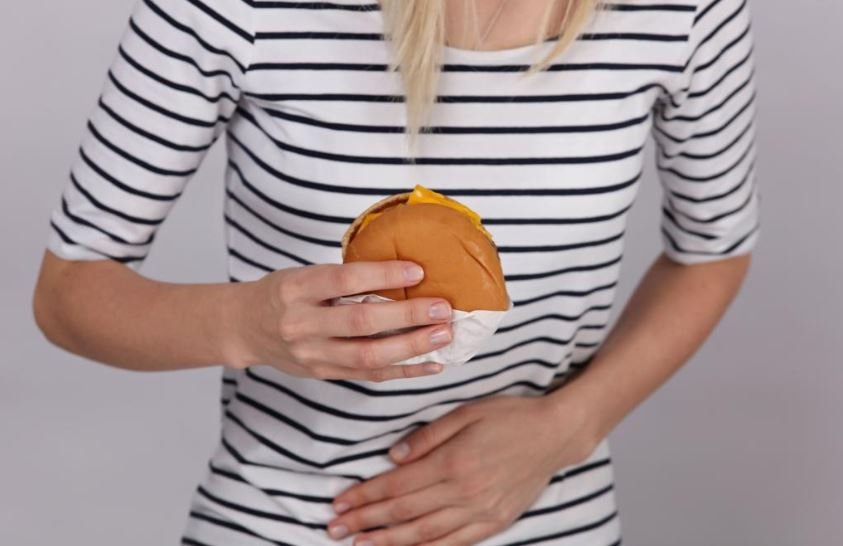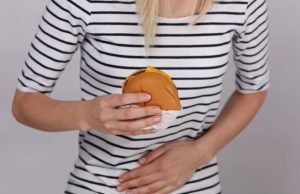

There is nothing as unfair as saying no to a sumptuous meal due to the fear of possible tummy pain after munching. It is even more disturbing when you are on an empty stomach and you cannot eat because you don’t want to endure extreme stomach pain after eating the meal. It can be even worse when you don’t really know why your stomach hurts after eating.
More than 20% of the world’s population has experienced belly ache after eating. The pain can be dull and will often go away on its own or sharp one. If you start experiencing excruciating stomach cramps after eating every meal until you lose your appetite, then that is a cause for concern.

My stomach hurts after I eat anything
We are going to look at some causes of mild or severe abdominal pains after munching and their remedies.
If your stomach aches after eating. Then this could be the reason;
You may be experiencing stomach pains and bloating after having a certain meal because you are eating food that your body cannot digest. Sometimes our bodies don’t have the enzymes to break down certain foods like lactose present in dairy products. In such cases, you will experience abdominal discomfort after munching followed with constipation and diarrhea.
If you are experiencing such pains after munching certain foods, then it’s important to document what you had and when the pain occurs. This will help you narrow down on your food to find out which one is causing the pain.
Eliminate the food that does not bode well for your digestive system to get rid of the stomach pains after eating.
A food allergy reaction occurs when your body immune system overreacts to a food or substance in a food, identifying it as a danger. Some signs of a food allergy include lower abdominal pain after eating, vomiting or stomach cramps and diarrhea afterward. Food allergies can cause life-threatening reactions.
Some of the foods that people are allergic to include peanut, eggs, milk, tree nuts, fish, wheat, and soy.
The primary way to manage a food allergy is to avoid consuming that causes you the abdominal pains after eating it. But how do you do this? If you don’t know the food you re allergic to, then you have to record all the food you eat so that you know which one is causing the stomach burns after you eat. Carefully check ingredient labels of food products to know whether they include the what you should avoid.
It is important to note that food allergy and intolerance have got almost the same symptoms; they all cause stomach pains while eating and only a diagnosis can help you know which condition is causing severe abdominal pain after munching
If you consume contaminate or spoiled food, then you will be on the receiving end of sharp stomach pain immediately after eating. The pains can be followed by diarrhea, vomiting and a fever.
Sometimes it is hard to say no to a second or third plate of a delicious meal. The problem is if the meal stretches you to the point you start experiencing stomach problems. Too much food will give you abdominal discomforts after having. There are people out there who are obsessed with eating excess food and after that, they start complaining ‘My stomach hurts when I eat.’
Stop eating more than your tummy can carry. But if you must, then eat little amounts of food frequently. Do you know that eating too much is wasting food because your body will digest only what it needs, the other one will go to waste.
There are several reasons including stress and lack of sleep that can explain why people over eat. Try overcoming these reasons if you want to get rid of stomach pain after eating.
if you are experiencing stomach pains after munching, you could be having the stomach and intestinal ulcers. These ulcers are sores in the lining of the stomach. Ulcers occur when the acid, produced by the stomach is allowed to reach its walls and damage tissues causing an ulcer. The symptoms of this ulcers include stomach burns after eating and upper left abdominal pains after eating. Other symptoms may include nausea, bloating and weight loss.
Before treatment, it is important to ascertain that it is indeed a stomach ulcer that is causing your stomach pains after you eat. There are several methods of treating these ulcers depending on the cause.
Avoid acidic foods because they contribute immensely to the stomach pains after you eat by irritating it.
Avoiding hunger by having meals frequently is also known to help.
A blockage or obstruction of the appendix will lead to its inflammation. This is a condition known as Appendicitis. Abdominal pain is the main sign of appendicitis. The pain becomes more unbearable after munching. Other signs include swelling of the abdomen which can cause a sore tummy after eating, nausea, vomiting and mild fever.
Apart from causing abdominal discomfort after having a meal, appendicitis is a dangerous life-threatening disease which should be treated immediately.
The treatment for appendicitis is usually antibiotics and a surgery known as an appendectomy. This is the surgical removal of the appendix.
Gallstones are solid particles that form from the bile and bilirubin of the gallbladder. Bile is a fluid produced by the liver to help in the digestion of fats and is stored in the gallbladder until needed. When the gallbladder responds to a fatty meal and you have gallstones, then you will experience painful upper stomach pain after having a meal. This is because fatty meals trigger the gallbladder to contract and if it’s inflamed due to the presence of gallstones, then you will experience upper right abdominal pains after a meal.
Gallstones can be life-threatening if not treated early. The secret to maintaining a healthy gallbladder is to get regular exercises, maintain a healthy weight and avoid rapid weight loss
Your doctor may recommend a surgery if the problem is severe.
If you are experience stomach pains after eating a large meal and the pain lasts for more than six hours, then you could be having pancreatitis. Severe upper left abdominal pain after eating is also a sign of pancreatitis. This disease is mostly caused by chronic alcoholism and gallstones.
Stomach pains after eating is a common short-lived problem among most people that should go away on its own but any pains that recur frequently after having a meal requires medical investigation.
You should also see a doctor if the stomach pains are accompanied by other symptoms like dehydration, dizziness, and fatigue. The stomach is a very sensitive part of the body and therefore seek help from qualified medical personnel only.